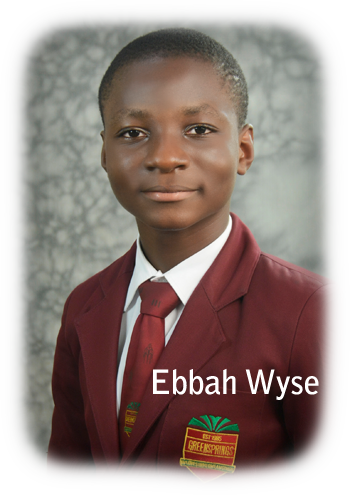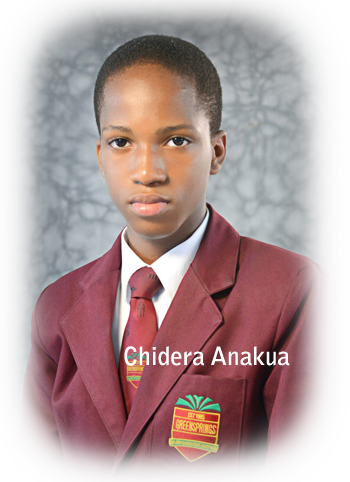We are delighted to inform you of the outstanding success of Ebbah Wyse, a fourteen year old fourth year secondary school student of Greensprings, who emerged as one of the top 10 winners in this year’s South African Mathematics Olympiad (SAMO) organised by South Africa Mathematics Foundation (SAMF).
The South Africa Mathematics Foundation (SAMF) annual awards took place on 24 September 2016 at the Kopanong Hotel & Conference Centre in Benoni, South Africa. At the ceremony, prizes were awarded in the two premier mathematics competitions, the South African Mathematics Olympiad (SAMO) for high school learners and the South African Mathematics Challenge (SAMC) for primary school learners.
Our student, Ebbah Wyse won the highest number of awards in the junior category of the competition:
-Runner-up (Silver medal)
-Best Performing African Learner
-Best Learner from outside South Africa
The preliminaries were held in Nigeria on May 11, 2016, where two of our students, Ebbah Wyse and Chidera Anakua, qualified in the junior category for the next stage of the competition. Chidera finally emerged as a bronze medallist.
Greensprings School is very proud to present both students as mathematics champions, who have made Nigeria proud on an international stage.
This is a national achievement and will definitely serve as a source of inspiration to parents in Nigeria, that if our children are properly guided, they can become outstanding students.
Executive summary of South African Mathematics Olympiad (SAMO)
The South African Mathematics Olympiad (SAMO)is an Africa wide mathematics competition, organised by the South African Mathematics Foundation (SAMF). The competition which started since 2004 provides an opportunity for young talented Africans, to showcase their dexterity in mathematics by competing among their peers.
The SAMO is the biggest Olympiad in South Africa. More than 85,000 students from 1,044 schools participated in the 2016 Olympiad.
The first round is written in March. The junior division consists of separate papers for grades 8 to 9 and the senior division, then one paper for grades 10 to 12. Each paper consists of 20 questions with multiple-choice answers and learners have one hour to complete the paper. Each school is provided with the solutions. For this round, the teachers mark the papers.
Learners who attain 50% or higher in the first round qualify for the second round which is written in May. There are separate papers for the juniors and seniors. This time the grade 8 and 9 learners write the same paper. Learners have two hours to complete twenty questions.
The best 100 senior and junior learners from the previous round qualify for the third round.
Every participant in the SAMO papers will be challenged by at least one problem and hence his or her problem solving skills will improve. Problem solving skills can be further improved by carefully working through the solutions of these rounds. SAMO presents alternative and innovative solutions and it is recommended that the problems used in the competition papers can be further used as resources for classroom discussions.
SAMF believes that creative problem solving skills are very necessary and marketable in today’s technically oriented market place. Hence expert problem solvers are needed. Practice in problem solving will help to train our future leaders for technological development and social engineering.
Educators are encouraged to enter as many learners as possible for the SAMO. These were dates for the 2016 Olympiad:
| Closing date for entries: | 5 February | |
| First round: | 9 March | |
| Second round: | 11 May | |
| Third round: | 27 July | |
It is well known that mathematics competitions generate a lot of enthusiasm and curiosity for the subject. This aspect of mathematics competitions is becoming more and more important. The school subject called “Mathematics” has recently moved more and more to what could be called mechanical calculations or numeracy. It is therefore very important that we continue to emphasize that mathematics is about thinking and the discovery and validation of problem solving methods.
Click on the following links to read more.



